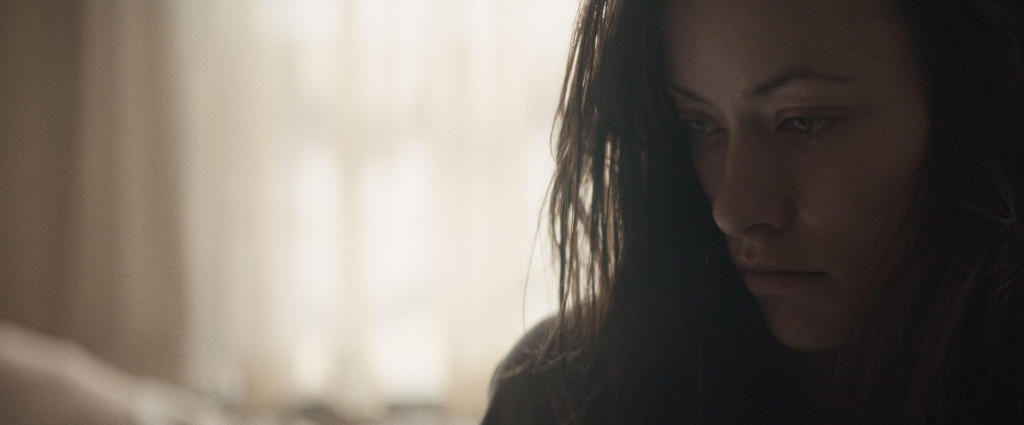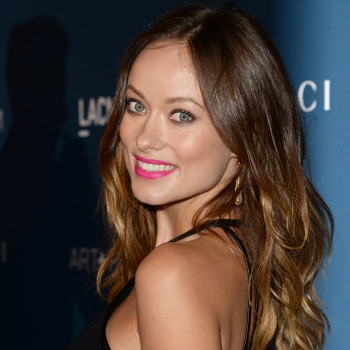Olivia Wilde is perhaps best known as Thirteen, the secretive doctor on the hit TV series “House.” She has also appeared in dozens of films including “Tron: Legacy,” “Rush,” and the Oscar-nominee “Her.”
Wilde’s latest film, for which she is both the star and the producer, is called “Meadowland.” It’s about a young couple whose child has gone missing. She plays the mother, Sarah.
It’s not your typical Hollywood drama… it’s as much a meditation on grief as it is a story. When Brendan met Olivia the other day, he asked her why she thought the film would work.

Olivia Wilde: When I read the script, and I saw that it did not focus on the disappearance of the child or the investigation, that it was focusing on one year later and what these parents were going through, I so appreciated that they were cutting out all the kind of procedural elements.
So, I knew that this was going to be different, and I loved how it wasn’t afraid to portray Sarah as the slightly less sympathetic one. You know, she’s– for instance, she teaches in a public school, and she’s a really terrible teacher.
Brendan Francis Newnam: Yeah.
Olivia Wilde: This is, like, this is not “Dangerous Minds.” This is not “Half Nelson.”
Brendan Francis Newnam: This is not “Stand and Deliver.”
Olivia Wilde: [Laughs.] No! She’s terrible. She doesn’t have the will to inspire other young minds.
Brendan Francis Newnam: Yeah, she’s going through the motions.
Olivia Wilde: Yeah, so we’re allowed to kind of create an unusual character that audiences are, I think, delighted by because she’s different.
Brendan Francis Newnam: And this is one of the benefits that comes from a movie that’s directed and produced by women, right?
Olivia Wilde: Yeah.
Brendan Francis Newnam: Because people talk about the need to have more women in Hollywood, but it’s not just for the sake of fairness, it’s because there’s going to be different perspectives and different ways to tell these stories.
Olivia Wilde: Exactly. Yeah, if you have more female filmmakers, you’re going to see more interesting female characters onscreen.
I mean, for instance, there were a couple things in this script where some of the male members of our production team said, “Well, that’s a little cold,” or, “That’s a little rough,” or, “That’s a little harsh. I can’t imagine that she would do that.”
And the women would say, “Oh, yeah, she would!” This woman is dealing with the worst possible scenario. I would do that and worse.
Brendan Francis Newnam: Yeah.
Olivia Wilde: And I thought it was interesting; men don’t like to think of women as being, in any way… of not being nurturing. They like to think of women as being nurturing, and it’s an interesting thing to have to say, “No, in order to fully respect women as equals, you have to allow for them not to be nurturing.”

Brendan Francis Newnam: You didn’t only act in this movie, but you produced it. What was that like, wearing two caps on a production like this?
Olivia Wilde: I think it did help me on this film, particularly, to be one of the producers because, for instance, there’s one scene in the film that’s kind of a release. Like, the character finally loses her mind and has a chance to finally kind of go nuts.
Brendan Francis Newnam: Catharsis.
Olivia Wilde: Yes, there’s true catharsis. And we shot it on this road in New Jersey called Fish House Road, which is a thoroughfare for 18-wheelers, and in order to shoot the scene, we had to stop traffic, which was really like stopping these trucks from delivering goods across America.
Brendan Francis Newnam: This is like the lifeblood of the mid-Atlantic region.
Olivia Wilde: Yeah, sorry, Amazon.com [laughs]. But we had about three or four minutes at a time to shoot the scene, and then they’d have to open up traffic again. So, had I just been an actor in the film, if they had said, “Listen, you have about 90 seconds to perform this incredibly difficult scene…”
Brendan Francis Newnam: To go deep.
Olivia Wilde: I would’ve been like, “What is this?!? The injustice! It’s so unfair!” And instead, because I knew exactly what went into that, I was like, “OK, let’s do this.”
Brendan Francis Newnam: Well, you’re not entirely a stranger to producing things. Both of your parents are award-winning journalists, Andrew and Louise Cockburn, who, in addition to having written several books, have also produced several documentary films.
Olivia Wilde: Yeah.
Brendan Francis Newnam: You come from a big journalistic family, in fact. Both your uncles are journalists. I believe even your grandfather on the one side was a successful journalist. How — if at all — does that inform your acting? Do you think it does?
Olivia Wilde: I think it does. You know, what they all have in common is they’re all storytellers. And I think this is my way of storytelling. I think I approach my characters in a sort of investigative journalist way. I like to gather as much information about them as possible. I like to ask… you know, in my mind, ask the other characters about them.
Often, if you look through a script, you’ll notice that other actors… sorry,
other characters responding to your character is actually giving you the most information about your character.So, just looking for those clues, and the thing that my family is great at is just being really curious and really observant. And I think that’s what makes a good journalist, a good writer, and I think a good actor, too. So, I live in New York. I love living in New York. I ride the subway every day. I get so many ideas from just being in the world. And I think part of that comes from my family and just the way we were raised to kind of keep our eyes open and ask a lot of questions.
Brendan Francis Newnam: But it occurs to me, when I was researching that, you know, D.C. is known for Hollywood for ugly people…
Olivia Wilde: [Laughs.] Yes.
Brendan Francis Newnam: So, clearly, you had to leave D.C.
Olivia Wilde: I had to get out of there!
Brendan Francis Newnam: You wouldn’t even survive there.
Olivia Wilde: It is a one-trick town, and that’s why L.A. was weirdly familiar to me when I got there. I mean…
Brendan Francis Newnam: That’s true. It’s an industry town about power.
Olivia Wilde: Yeah. Everyone’s kind of doing the same thing. You know, I was a total outsider when I moved there. I wore a lot of brown corduroy, so I stuck out a lot.
Brendan Francis Newnam: In L.A.?
Olivia Wilde: Stuck out.
Brendan Francis Newnam: Yeah, well, you fit right in in public radio with brown corduroy.
Olivia Wilde: I really do [laughs].
Brendan Francis Newnam: Although, you’re wearing — that looks more like Rachel Comey or something like that. That does not really…
Olivia Wilde: That’s true! This is not the typical me.
Brendan Francis Newnam: Yeah. Well, you were on television today.
Olivia Wilde: Exactly.
Brendan Francis Newnam: Alright. Well, look, we have two standard questions we ask our guests. And the first question is: what question are you tired of being asked in interviews?
Olivia Wilde: There are so many. I played a doctor on television for five years.
Brendan Francis Newnam: That’s right, in “House.”
Olivia Wilde: In “House,” and people ask me if I actually feel like a doctor. If I…
Brendan Francis Newnam: Interesting. Do they ask you for diagnoses?
Olivia Wilde: …if I learned any medical knowledge.
Brendan Francis Newnam: And this is dangerous because if you were, say, I don’t know, getting a sandwich somewhere, and someone started choking, people are going to look to you to help them, and it’s like, what the heck?
Olivia Wilde: It has happened on an airplane.
Brendan Francis Newnam: Really?
Olivia Wilde:
It’s happened on an airplane, where they said, “Is anyone on the plane a doctor?”
Brendan Francis Newnam: Are you kidding?
Olivia Wilde: And the people have looked to me like, “Can you help?” And the problem with it is that I actually think I can help.
Brendan Francis Newnam: Wow.
Olivia Wilde: Like, I’ve convinced myself that I know a lot more about the medical profession than I actually do.
Brendan Francis Newnam: That’s method.
Olivia Wilde: So, it’s very dangerous. Don’t tempt me! I will perform surgery on you.
Brendan Francis Newnam: Alright. I’m glad I’m perfectly healthy for this portion of the interview. OK, let me get to our second question, which is: tell us something we don’t know. And this could be an interesting fact about you that you haven’t shared in interviews, or it could just be an interesting piece of trivia.
Olivia Wilde: Gosh. Isn’t it so sad when you realize you’ve divulged so much about yourself?
Brendan Francis Newnam: Well, you are an actor, and you have been for a long time.
Olivia Wilde: You don’t know if there’s anything people don’t know.
Brendan Francis Newnam: Let me think. I mean, there are some interesting tidbits to your biography that I’m not sure everyone knows.
Olivia Wilde: OK, help me out.
Brendan Francis Newnam: Well, you’re going to be in this upcoming Scorsese HBO show called “Vinyl.”
Olivia Wilde: Yes! That’s right.
Brendan Francis Newnam: So, that’s about ’70s rock ‘n’ roll. And I did read about an anecdote where, as a little girl…
Olivia Wilde: Yes.
Brendan Francis Newnam: …Your parents were kind of big dinner party throwers in D.C. And Mick Jagger sent you to bed.
Olivia Wilde: Yeah, but not in the way that you imagine Mick Jagger sending people to bed.
Brendan Francis Newnam: I wouldn’t let Mick Jagger anywhere near my little girl, first of all [laughs].
Olivia Wilde: Oh, no!
Yeah, that may be something people don’t know. Mick Jagger is a really smart dude…
Brendan Francis Newnam: Went to the London School of Economics.
Olivia Wilde: Exactly, very interested in economics, very interested in the world, and I think, when he’s in D.C., he likes to hang out with, you know, the nerds.
Brendan Francis Newnam: Politicos and journalists.
Olivia Wilde: Exactly, and my parents had some of the best dinner parties for the nerds, the coolest of the bunch, and I really… I used to climb under the dining room table with a pillow, thinking that none of them knew I was there, like, I would Army crawl under their legs, and just lay down and listen to them talk.
And at one point, Mick Jagger was there, and this was an unusual thing, to have someone from, like, the “shiny” professions.
Brendan Francis Newnam: Yeah.
Olivia Wilde: You know, music and entertainment, and I had no idea who he was, and I said, “Excuse me, you’re sitting in my chair,” because that was my place at the dinner table.
Brendan Francis Newnam: How old were you?
Olivia Wilde: God! I mean, I must’ve been… I was really young. I was eight or something.
Brendan Francis Newnam: Yeah, and so what happened?
Olivia Wilde: And he just said [imitating Mick Jagger], “Go to bed!”
And I was like, “Who is this guy?”
Brendan Francis Newnam: So, when you were crawling under there, could you recognize from his boots that he was a rock star?
Olivia Wilde: I was like, “Who’s this guy? What are these pointy shoes?”
Brendan Francis Newnam: They were probably platforms.
Olivia Wilde: [Laughs.] “Who’s this lady?”


